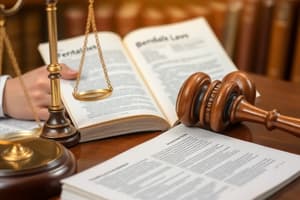Podcast
Questions and Answers
Which political party had the highest number of MPs in the 17th Lok Sabha Elections?
Which political party had the highest number of MPs in the 17th Lok Sabha Elections?
- Indian National Congress (INC)
- Bharatiya Janata Party (BJP) (correct)
- Dravida Munnetra Kazhagam (DMK)
- Shiv Sena (SS)
How many MPs did the Bahujan Samaj Party (BSP) secure in the 17th Lok Sabha Elections?
How many MPs did the Bahujan Samaj Party (BSP) secure in the 17th Lok Sabha Elections?
- 12
- 22
- 10 (correct)
- 18
Which political party is represented by 16 MPs in the 17th Lok Sabha Elections?
Which political party is represented by 16 MPs in the 17th Lok Sabha Elections?
- Janata Dal (United) (JD (U)) (correct)
- Biju Janata Dal (BJD)
- All India Trinamool Congress (AITC)
- Yuvajana Sramika Rythu Congress Party (YSRCP)
Which of the following parties had 24 MPs during the 17th Lok Sabha Elections?
Which of the following parties had 24 MPs during the 17th Lok Sabha Elections?
Which party, based on the results, is least likely to influence government formation due to having only 10 MPs?
Which party, based on the results, is least likely to influence government formation due to having only 10 MPs?
What critical role do citizens play in the creation of laws?
What critical role do citizens play in the creation of laws?
What is one characteristic of unpopular laws as mentioned in the content?
What is one characteristic of unpopular laws as mentioned in the content?
How should students ideally engage with the topic of laws in the classroom?
How should students ideally engage with the topic of laws in the classroom?
What teaching strategy is recommended to help students understand the political process?
What teaching strategy is recommended to help students understand the political process?
What is a significant focus of Chapter 3 related to laws?
What is a significant focus of Chapter 3 related to laws?
Flashcards are hidden until you start studying
Study Notes
Parliament and the Making of Laws
- A continuation of the government theme from earlier classes, focusing on elections, representation, and participation.
- Emphasizes the importance of citizens' roles in a parliamentary democracy, highlighting their ability to influence legislation.
- Unpopular laws may restrict Fundamental Rights of certain groups, leading to protests; history provides examples of such cases.
Lok Sabha Elections (2019)
- Bharatiya Janata Party (BJP) secured the majority with 303 MPs.
- Other significant parties: Indian National Congress (INC) with 52 MPs, and Dravida Munnetra Kazhagam (DMK) with 24 MPs.
- Total of 543 MPs were elected, impacting the government formation process and coalition dynamics.
Role of Rajya Sabha
- Represents the states within the Parliament; can initiate and amend legislation.
- Composed of 233 elected members and 12 nominated by the President, highlighting its mixed composition.
- Plays a critical role in reviewing legislation passed by the Lok Sabha.
Parliamentary Procedures and Responsibilities
- Question hour is vital for MPs to hold the government accountable; it serves as a tool for providing insights into governmental operations.
- Opposition parties are crucial in a democracy for critiquing government policies and garnering public support.
Public Influence on Laws
- Citizens can challenge unpopular laws, applying pressure on Parliament to amend or repeal them.
- The example of Rosa Parks illustrates civic resistance against unjust laws, linked to broader movements for civil rights and social justice.
Examples for Classroom Engagement
- Use real-world examples to illustrate concepts, such as hawking regulations and their impact on livelihoods.
- Encourage students to debate the implications of laws on different societal groups, focusing on how these laws align with or violate Constitutional rights.
Studying That Suits You
Use AI to generate personalized quizzes and flashcards to suit your learning preferences.



